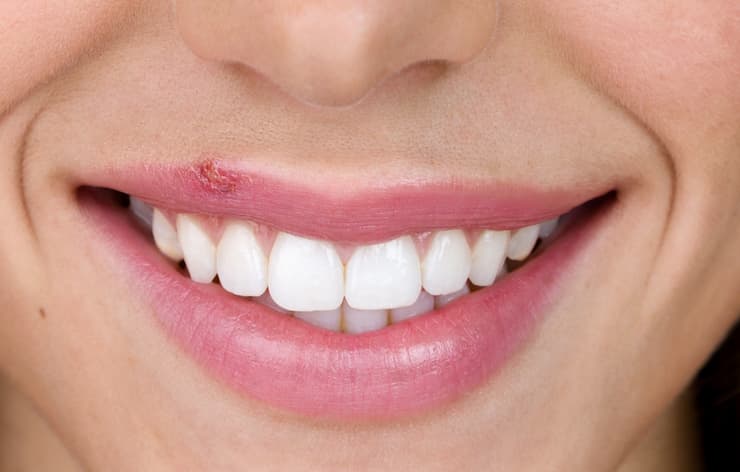
How Long Does a Cold Sore Take to Heal?
A cold sore passes through a distinct set of stages before it finally heals. In the first stage, the sore isn’t visible, but the person knows one is on its way due to the tingling, burning or itching sensation near the lips. Next, the fluid-filled blisters appear, which give cold sores their other name of “fever blisters.”
After the blisters pop, the sore forms a scab. Finally, the scab may flake off and the skin returns to normal. According to the American Academy of Dermatology (AAD), a cold sore should heal in about two weeks in people who are otherwise healthy.
Why Is Popping a Cold Sore Harmful?
Popping a cold sore can lead to a bacterial infection, and it can spread the virus that causes sores. If you pick at the blisters or scab, the cold sore can become infected and eventually the skin may become scarred.
What’s more, the fluid inside the blisters is full of the cold sore virus: herpes simplex virus type 1, or HSV-1. The virus is highly contagious and can easily transfer to other parts of the body and other people. The AAD advises people with HSV-1 who are experiencing an outbreak to avoid intimate contact, kissing and sharing food, beverages and personal items like lip balm or towels. Anyone with an open cold sore should also keep their distance from those with weakened immune systems.
Safe Cold Sore Care
Can’t leave that lump alone? Alternatives to popping a cold sore include cold compresses, cold sore ointment and cold sore medication, or seeing your dentist for a cold sore laser treatment. Pressing a cold, damp cloth to the sore can help reduce discomfort and speed healing. In fact, pressing an ice cube to the spot where you feel the initial tingling sensation may prevent a cold sore from appearing, according to the Summit Medical Group.
Over-the-counter ointments for treating cold sores, when applied according to the directions, can shorten an outbreak. Ask your doctor about antiviral cold sore medications, which are only available by prescription. These medications work best when they’re applied before a cold sore appears, and they may prevent them from appearing at all.
The Mayo Clinic mentions several cold sore remedies, including lysine, which can be applied as a cream or taken orally, and synthetic beeswax called propolis, which may speed healing if applied often from the beginning of an outbreak. The Mayo Clinic also says that rhubarb and sage cream could be as effective as acyclovir, an antiviral treatment. Stress is a common trigger for cold sores, so relaxation techniques may also help prevent the sores from appearing.
Though a cold sore can be annoying, popping the blisters isn’t going to make the sore heal any faster and could lead to more problems. Try one or a combination of treatments and speak to your family doctor if you experience frequent outbreaks. If you treat a cold sore safely and hygienically, it should heal quickly without scarring and you can avoid spreading the virus.
